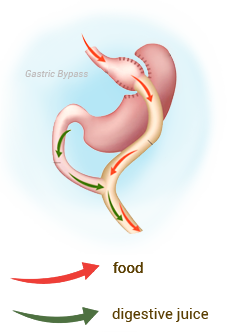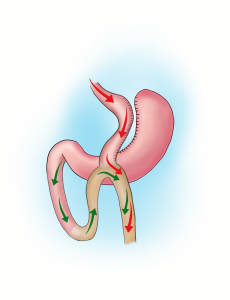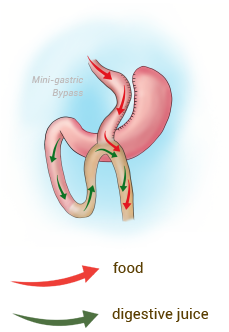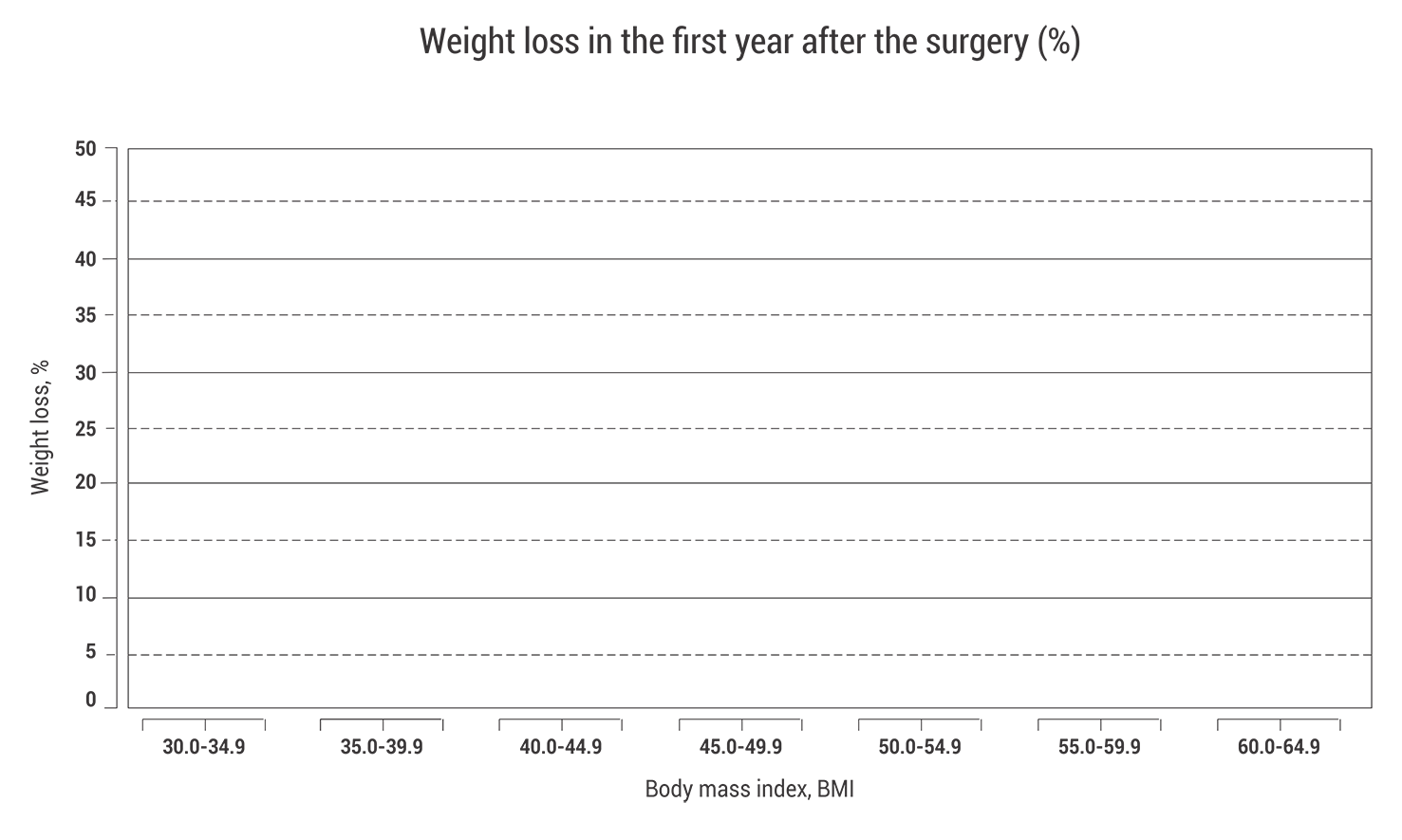Gastric bypass surgery

Gastric bypass surgery
Gastric bypass surgery has been performed since 1977, and, since 1994, it has been performed laparoscopically. It is a universal operation performed worldwide; therefore, a lot of research and long-term follow-up have been conducted. The operation is used to treat obesity and other life-threatening diseases along with it. The operation is performed laparoscopically. A video camera with thin instruments is inserted into the patient’s abdominal cavity through small 1.5 cm incisions. With modern electronic staples, a small pouch is created from the stomach. The pouch is then connected to small intestine, bypassing the rest of the stomach and one third of the first section of the small intestine. The pouch is not a reservoir of food – the food goes directly to the small intestine, where the digestion process begins and appetite-regulating hormones are released. These hormones, in turn, signal to the brain about satiation, because the food is already in the digestion section of the small intestine. The brain and hormones also influence other organs, such as the liver, pancreas, kidneys, readjusting the metabolism towards energy consumption. The main stomach, duodenum, and part of the small intestine continue to participate in the digestive process, secreting digestive juices, bile, and other substances. Another connection is made between the loops of the small intestine to prevent reflux of bile into the small pouch. Since part of the intestinal tract is bypassed, less vitamins and trace elements are absorbed.
Benefits
- Weight loss with a lasting effect in long term.
- Feeling of satiety after taking small amount of food.
- Obesity-related diseases such as type 2 diabetes, sleep apnea, depression, arterial hypertension, joint and back pain caused by osteoarthritis, heartburn due to stomach acid, polycystic ovary syndrome, which is one of the causes of infertility, decrease or disappear.
- Cholesterol levels decrease, blood pressure and glycaemic levels normalize, thereby reducing the risk of stroke, myocardial infarction, and prolonging life.
- Gastric bypass surgery has been recognized as the most effective and best long-term weight loss method for patients with class III obesity. In a year, it is possible to lose about 80% of excess weight, or 25% or more of total body weight. In a year, it is possible to lose about 80% of excess weight, or 25% or more of total body weight.
- Operation is reversible – the previous anatomy can be restored.
- Healthy self-confidence develops, wellbeing improves.
- There are no restrictions on physical, professional and hobby activities.
Recommendations
- Consultation, supervision, and support of a nutritionist is required.
- Psychologist/ psychotherapist support is recommended.
- After operation, B vitamins, vitamin D, calcium, and, in some cases, iron preparations should be taken constantly.
- Blood tests should be done to check possible vitamin deficiency.
- To avoid post-operative complications, the specialist’s instructions on the desired lifestyle should be respected.
- A liquid diet should be followed for three weeks after surgery.
Considering the patient’s weight, health condition, and the results of pre-operative examinations, the surgeon can recommend a certain type of surgery. The final decision is made by the patient together with the surgeon.


Mini-gastric bypass
This operation was performed for the first time in 1997 – with the idea of finding a simpler but equally effective method as gastric bypass. The operation was initially not accepted, because by making only one connection between the stomach and the intestine, there is a possibility that there will be a bile burn in the esophagus and after 30 years, the development of an oncological disease in the esophagus is possible. Currently, the development of oncology has not been proven, however, in some cases, there is bile in the esophagus. The operation proved to be just as effective for weight loss and disease treatment as Gastric Bypass. During this, a small stomach is created, but unlike Gastric Bypass, it is longer so that bile is less likely to flow into the esophagus. The small intestine is attached to the small stomach, thus the end of the operation is reached in a shorter time. The risk of surgical complications is lower than Gastric Bypass. The mechanism of satiety is the same as Gastric Bypass.
Benefits
- Weight reduction with a lasting effect in the long term
- Feeling full after taking a small amount of food
- Diseases associated with obesity are reduced or eliminated – type 2 diabetes, sleep apnea, depression, arterial hypertension, joint and back pain due to osteoarthritis, heartburn due to stomach acid and polycystic ovary syndrome, which is one of the causes of infertility
- Cholesterol levels decrease, blood pressure and glycemic levels normalize, thereby reducing the risk of stroke, myocardial infarction and prolonging survival
- Gastric bypass surgery has been recognized as the most effective and long-term best weight reduction method for patients with III degree obesity.
- The operation is reversible – the previous anatomy can be restored
- Healthy self-confidence is formed and the feeling of well-being improves
- No restrictions on physical, professional and hobby activities
Recommendations
- Consultation, supervision and support of a nutrition specialist is needed
- The support of a psychologist/psychotherapist is recommended
- After surgery, B group vitamins, vitamin D and calcium should be taken constantly, in some cases – iron preparations
- Blood tests should be done for possible vitamin deficiency
- To avoid possible post-operative complications, follow the specialist’s instructions on the desired lifestyle
- The operation is more suitable for people aged 50 and over with III degree obesity
- A liquid food diet should be followed for three weeks after the operation
Taking into account the patient’s weight, state of health and the results of pre-operative examinations, the surgeon can recommend a certain type of surgery. The final decision is made by the patient together with the surgeon.


